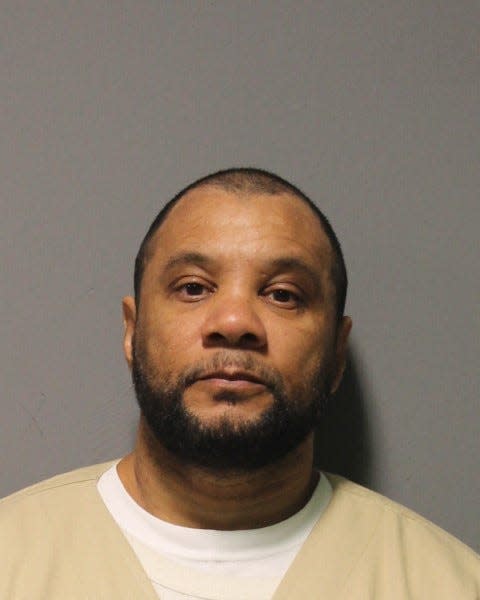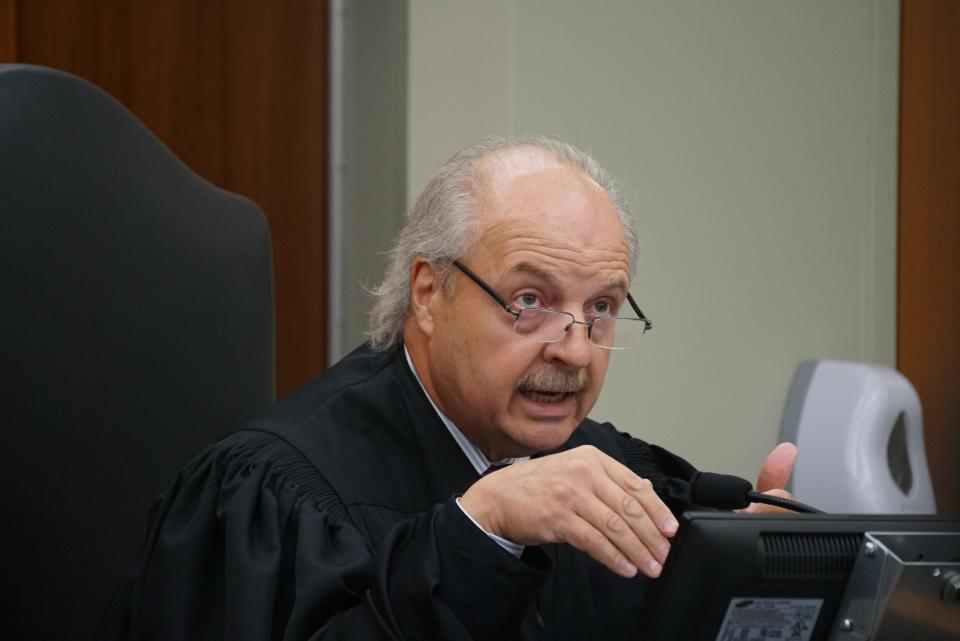Do long sentences for young offenders merit 'second look'? Judge asks lawmakers for leeway
PROVIDENCE — A Superior Court judge is calling on state lawmakers to empower judges to take a “second look” at cases involving offenders serving long sentences for crimes they committed when they were young, and he's using a case involving the 1995 slaying of a state lawmaker's son to carry the message.
The urging comes from a recent Superior Court ruling by Judge Daniel A. Procaccini in the case of Gahlil Oliveira, one of five men charged in the shooting death of 26-year-old John Carpenter in broad daylight on Dec. 18, 1995, on Dexter Street, near the Cranston Street Armory. The murder of Carpenter, the son of state Rep. Marsha E. Carpenter, was believed to be in retaliation for the killing of the men's friend three days earlier.
“The Court observes that society seems to be rediscovering the value of the rehabilitative ideal — especially as it relates to our young people — an ideal embodied by petitioner …,” Procaccini wrote. But the judge observed in “regrettably” denying the application that he has no legal avenue to grant relief.
“If Rhode Island had legislation permitting a 'second look' or review of petitioner’s sentence, … this Court would have no hesitation in reconsidering petitioner’s sentence imposed over twenty-five years ago,” the ruling states.
More:They spent much of their lives in prison. This program helps them break up with their past.

Juvenile life sentences being examined across the country
In recent years, the U.S. Supreme Court has issued a series of rulings recognizing that juveniles are constitutionally different from adults when it comes to sentencing. The court set limits on when a judge can impose the death penalty or life without parole on youthful offenders, in a nod to science indicating that young minds continue to evolve well into the 20s.
Twenty-five states and the District of Columbia, likewise, have moved to ban life sentences without the possibility of parole for people under 18, according to the Sentencing Project.
And in 2021, Rhode Island legislators passed Mario’s Law requiring that any person who commits a crime before their 22nd birthday be eligible for parole review after serving 20 years, unless they are serving life without parole.
Oliveira, now 50, wants another look at his sentence
Testimony at trial revealed that Carpenter had been hit multiple times by gunfire from three weapons as he lay on the ground in the city’s West End. His passenger had also been targeted but escaped unscathed.
All five men were convicted of various charges after a trial two years later. Then Superior Court Judge Maureen McKenna Goldberg sentenced Oliveira, 25 at the time, to serve life in prison, plus a consecutive 40 years.
Now 50, Oliveira is challenging that sentence as excessive and unconstitutional, given his age at the time of the murder — 23 — and his rehabilitative efforts. He says he is no longer the “immature street kid who the State and Court correctly characterized as having contributed virtually nothing to the community and society.”
Oliveira highlights his experience as a mentor to younger men in prison, his completion of dozens of programs and classes, his status as a person capable of handling positions of trust, and his acceptance of responsibility for his crimes.
The Parole Board noted Oliveira's growth and contrition in granting him parole on his life sentence, observing his “significant positive strides in his education, programming, rehabilitation[,] and insight.” Oliveira is now serving his consecutive 40 years. It’s from that time that he seeks relief.
He has argued that his progress and deep regret transcend the sentencing judge’s fears that he’d pose a threat to public safety “at whatever age.”
To support his case, Oliveira relied on findings from the National Institute of Mental Health stating that the human brain doesn’t finish developing and maturing until the mid- to late 20s and that the prefrontal cortex, the area responsible for “planning, prioritizing, and controlling impulses,” is one of the last regions to mature. As such, teenagers are “more likely to engage in risky behaviors without considering the potential results of their decisions,” he said through his lawyer, Glenn Sparr.
Oliveira argued, too, that McKenna Goldberg’s primary reasons for sentencing him to such a lengthy term were the heinousness of his crime and her belief that he was incapable of rehabilitation. But, he asserted, the consecutive sentence is no longer necessary to achieve the sentencing justice’s purposes and that it was otherwise unconstitutionally excessive in the absence of “extraordinary aggravating circumstances."
More:A murder defendant allegedly had sex in custody. Did it influence his sentence?
The state: Parole Board is proper venue for Oliveira's 'plea for leniency'
The state countered that Oliveira was actually seeking to be resentenced and that his motion was a mere ”plea for leniency” that falls within the “sole prerogative of the parole board.”
Procaccini noted that the state Supreme Court has held that the state’s ban against cruel and unusual punishment mirrors that contained in the Eighth Amendment, but that the high court had not yet addressed juvenile sentencing through the lens of more recent U.S. Supreme Court rulings.

In 2010, the state high court, however, upheld a life without parole sentence in the case of William Page, a 19-year-old drifter who with another teen killed a homeless man in 1995. The court based its decision on the heinousness of the crime; Page’s “blatant disregard for human life”; and his criminal track record. Three years earlier, the court also let stand consecutive life sentences for Mario Monteiro, the then 17-year-old gang member convicted of murder who was at the center of Mario’s Law.
That court precedent was binding on Oliveira’s case, Procaccini said.
“While the Court commends petitioner for his efforts and personal growth, it can find no such broad consensus that would serve to invalidate Petitioner’s sentence as unconstitutional,” the ruling states.
Procaccini said that though he is constrained by the law to uphold Oliveira’s sentence, “in over twenty years, this Court has rarely — if ever — been presented with an application for post-conviction relief demonstrating the level of genuine rehabilitation and remorse” that Oliveira has shown.
More:Investigating her mother's death helped Lauren Lee Malloy find her calling and help others
Judge says RI should reembrace the 'rehabilitative ideal'
The judge noted that state law has grown even more punitive since Oliveira was sentenced — a shift that commentators have characterized as an abandonment of the “rehabilitative ideal.” Oliveira would face mandatory consecutive life sentences today — as is the prerogative of the state legislature under current state law.
The Model Penal Code, standardized laws used to assist legislatures, and the American Bar Association both recommend mechanisms to reexamine sentencing.
"Although Rhode Island has not enacted second-look sentencing, our Legislature has pursued other reforms that demonstrate reestablishment of the rehabilitative ideal," the judge said, referring to the Department of Corrections implementing “good time” credits and the provisions of Mario’s Law.
Brian Hodge, a spokesman for Attorney General Peter F. Neronha's office, said the office agrees with Procaccini's conclusion that he had no ability to grant the defendant a sentence reduction.
"The Attorney General believes that the Parole Board is the proper avenue for requests for early release once the sentencing court has imposed sentence and the [120-day] time period for filing a motion to reduce sentence has passed," Hodge said in an email. "The Attorney General is always mindful of the impact requests for early release have on victims and families of victims and believes that the current system adequately balances the rights of defendants for whom early release is potentially available and victims and families of victims who believe that early release would constitute an injustice."
The Rhode Island Association of Criminal Defense Lawyers embraced Procaccini's call for more judicial latitude in assessing sentences.
More:Despite acquittal in shooting of teen, Pawtucket moves to fire Daniel Dolan
"[A]s a policy matter, issues concerning recidivism and an individual’s ability to advance and change are complex. As we learn more about recidivism, sociological studies continue to teach that the 'warehousing' of criminal defendants is short-sighted, costly, and cruel," RIACDL said in a statement.
The association observed that Rhode Island has been "at the forefront of efforts to rectify this old way of thinking," commending state lawmakers and Gov. Dan McKee for the passage of Mario’s Law.
"Now, it is the judiciary — via a decision by an experienced criminal trial justice — crying out for discretion to address lengthy sentences after a showing of sincere rehabilitation," the association said.
The association also calls on the courts to reconsider the current 120-day timeframe after sentencing for an individual to file a motion to reduce, "especially given that true rehabilitation takes time."
Marsha Carpenter, the victim's mother, could not be reached for comment on this story. Oliveira's lawyer, Glenn Sparr, did not respond to inquiries.
This article originally appeared on The Providence Journal: RI judge seeks 'second look' at lengthy sentences for young offenders

